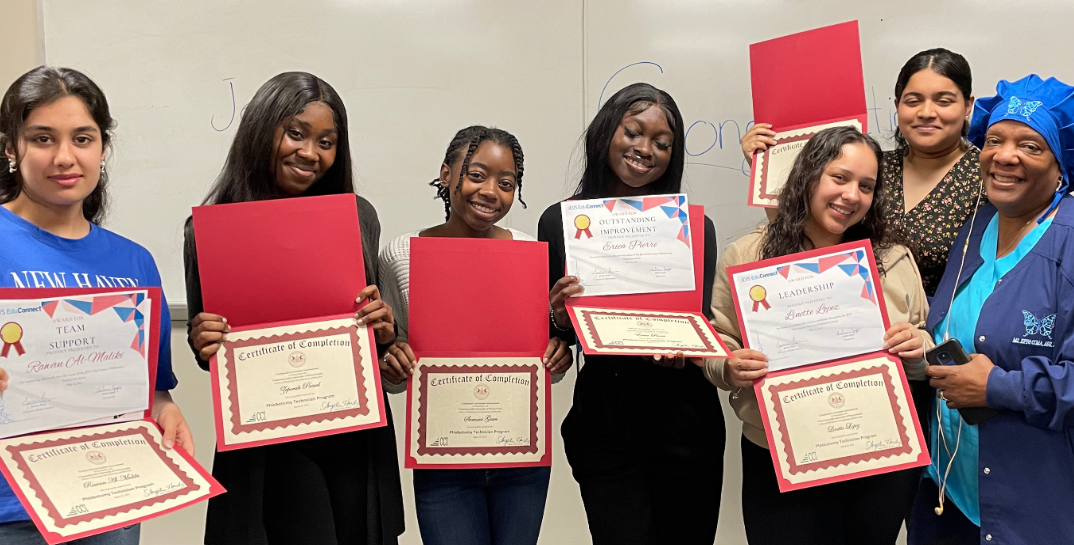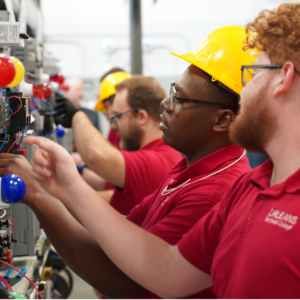PHILADELPHIA (KYW Newsradio) — When the Russia-Ukraine war began two years ago, Yana Klimova and her husband Ivan Gorbatkov quickly realized there was no safe place for them at home.
“We don’t want to go to Russia and we cannot go in Ukraine because my husband, he is a Russian citizen,” said Klimova, who is Ukrainian. They met while they were working on a Carnival Cruise.
“Because of my long contracts and short vacations, I didn’t really follow the politics,” Gorbatkov remembered. “So when it happened, I just grabbed two bags and left.”
He protested the Russian government, saying new laws put his life in danger. “You can’t even stand with a blank piece of paper.”
Fortunately, friends sponsored them to come to Philadelphia nearly a year and a half ago, as part of the Biden administration’s Uniting for Ukraine program.
“It’s difficult to leave everything behind and come to a new country to start a new life,” Klimova said.
Her life and the lives of thousands of others were upheaved due to war. As of December 2023, nearly 6.5 million Ukrainian refugees were recorded worldwide, according to the United Nations High Commissioner for Refugees. About half a million fled to the U.S., ABC News reported. More than one-quarter of Ukraine is currently under Russian control.
“This happened in a matter of six months,” said Archbishop Borys Gudziak, leader of the Ukrainian Catholic Archeparchy of Philadelphia. “It was the biggest and fastest forced migration of Europe since World War II.”
In August 2023, some Ukrainians who came to the U.S. through the Uniting for Ukraine program became eligible for temporary protected status, which means they are temporarily barred from returning to their home country because it is not currently safe.
“A lot of people will not be able, either financially or emotionally, to return back to Ukraine after [this] conflict is over,” said Igor Voloshen, a Ukrainian American immigration attorney based in the Philadelphia area. Since the war, he has had to expand his office to deal with many more inquiries from Ukrainians about their futures in the U.S.
“Should they start buying real estate in the United States? Should their kids pursue higher education?” he said. “I have two dedicated specialists who now are assisting me with solely Ukrainian-related cases.”
Voloshen noted immigration matters for people like Klimova and Gorbatkov could become more complicated after the next presidential election.
“What are our options if, in fact, we are not able to extend our documents? Or if the change in administration takes place and Ukraine does not remain a priority for the American government?” he asked.
For now, Gorbatkov is working in construction in Philadelphia and Klimova is helping other immigrants, through the nonprofit JEVS Center for New Americans.
“Two years of war, we’re still speechless,” he said.
‘If you can help’
“I want you to do three things, members of the audience,” Gudziak said to his congregation. “If you can pray, if you can advocate, if you can help.”
Over the past two years, the people of Ukraine received a tremendous amount of donations and other forms of support from around the world. There were volunteers with various backgrounds who traveled to the war-torn country to assist however they could, like Gudziak, who also serves as president of the Ukrainian Catholic University in Lviv.
Gudziak visited Ukraine 10 times over the past two years, traveling extensively throughout the war torn country for various reasons.
“I go to funerals and go to the cemetery to be with those who mourn. I meet with politicians, civic leaders, journalists, soldiers, hospitals, army chaplains, medical staff.”
Archbishop Borys Gudziak of the Ukrainian Catholic Archeparchy of Philadelphia speaks at the National Press Club in Washington, D.C. in 2022. Photo credit Win McNamee/Getty Images
Gudziak says since the start of the war on Feb. 24, 2022, Ukraine has seen great devastation. Hundreds of thousands of people have been killed and hundreds of thousands are missing. The exact numbers aren’t known.
“In the occupied territories, the Russians don’t allow international organizations to monitor whatever is happening there and Ukrainian and Russian military officials do not issue casualty figures,” he explained.
Joe Dubyk of Jamison, Bucks County is another area volunteer. The 37-year-old Ukrainian-American roofer took two trips to Ukraine and spent a total of eight months aiding humanitarian efforts and developing drones for the military.
“It’s really sad, all of this death and destruction,” Dubyk said, reflecting on how much of a difference his efforts made.
Joe Dubyk of Bucks County spent eight months in Ukraine aiding humanitarian efforts and designing drones for military use. Photo credit Joe Dubyk
“On a small level, sure,” he said, “I know I got a lot of drones to some guys. I probably saved some lives. But on a macro level, probably not.”
In addition to prayers, the archbishop says Ukraine needs advocates to contact U.S. politicians to approve funding for aid. A standoff on Capitol Hill over an aid package containing $60 billion in military aid has advocates around the world standing up for Ukraine.
“The military assistance is critical because the armaments are literally running out,” said Gene Luciw, president of the Ukrainian Congress Committee of America‘s Philadelphia branch.
The group is a non-partisan community-based organization that has represented the interests of Ukrainians in the United States since 1940. Luciw also sits on its national board.
“We are all meeting with our congresspersons, with senators, with parliamentarians, with world leaders as best as we can, advocating and telling people that Ukraine needs assistance,” he said.
In addition, Luciw calls on the public to make financial contributions through one of the many charities helping the people of Ukraine. “Ukraine will stand, but without U.S. military assistance, it’s not going to end well,” he said.



